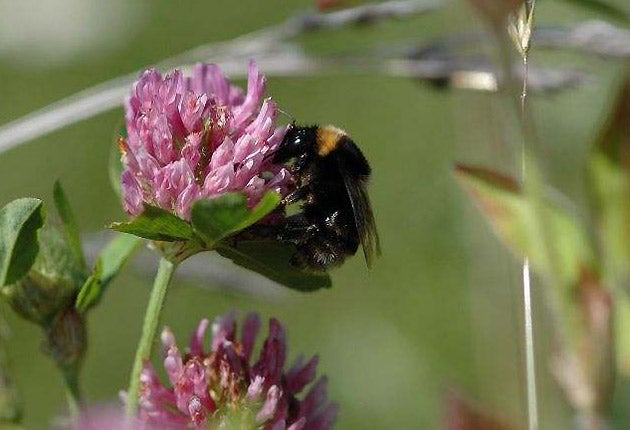Britain helps prevent ban on pesticides linked to bee decline
Failed vote means substances can continue to be used despite campaigners’ concerns

Neonicotinoids, the pesticides blamed for declines in bee numbers across the world, can continue to be used in Europe for the time being after a number of countries including Britain failed to support a ban in a crucial Brussels vote.
To the dismay of environmental campaigners, but to the relief of the pesticide industry and some agricultural scientists, the vote resulted in a stalemate. 13 of the 27 European Union member states voted in favour of a ban, while nine voted against and five, including Britain, abstained.
The arithmetic of the vote meant that the necessary qualified majority – with votes weighted according to member states’ populations – could not be obtained, and so the vote was deemed inconclusive.
However, the question of a ban is likely to be voted on again fairly soon. If the issue remains deadlocked, it is possible that the European Commission, the EU civil service which proposed the ban in the first place, could act to bring one in on its own initiative.
At the very least, the formal vote of all the EU countries means that the issue of neonicotinoids and bee health, which was shrouded in obscurity until fairly recently, is now rising to the top of the international political agenda.
Beekeepers and environmental scientists have become more and more concerned at the mass die-offs of bees seen in recent years, including the phenomenon known as Colony Collapse Disorder widely observed in the US. The finger has increasingly been pointed at neonicotinoids, a relatively new class of pesticides manufactured by the giant agribusiness companies Bayer and Syngenta.
More than 30 separate scientific studies in the last three years have shown adverse effects on insects such as bees from the chemicals, which attack insects’ nervous systems, and are ‘systemic’ – meaning they are taken up in every part of the plants to which they are applied. This means that they are not just present on the leaves and seeds which pest insects might eat, but also in the pollen and nectar gathered by bees in the process of pollination.
The proposal for a European ban of the three commonest neonicotinoids – imidacloprid and clothianidin, made by Bayer, and thiamethoxam, made by Syngenta – came from the Brussels Commission after a report from the European Food Safety Authority in January said the substances posed a high risk to bee health.
Britain’s failure to support it had already been signalled by the Environment Secretary, Owen Patterson, who said that the Government wanted to receive the results of its own trials of the effects of neonicotinoids on bees, expected later this year, before taking a firm decision.
Britain was joined in abstaining by Germany, Bulgaria, Estonia and Finland, while the vote for a ban was led by France, Italy and Slovenia – all states which have banned neonicotinoids themselves. Ireland, Hungary and the Czech Republic were among countries which voted against.
Environmental campaigners were dismayed at yesterday’s outcome. “We are very disappointed that the proposed ban has not been approved today,” said Matt Shardlow, Chief Executive of Buglife. “It was the bare minimum that could have been done to address the high risk to our pollinator populations.
“There is a consensus to stop the damage now, but the pesticides industry and a minority of member states don’t care about the environmental damage and want to prevaricate by pushing for never-ending research projects.”
However John Atkin, chief operating officer of Syngenta, said: “We are pleased that EU member states did not support the European Commission’s shamefully political proposal. Restricting the use of this vital crop-protection technology will do nothing to help improve bee health.”
Join our commenting forum
Join thought-provoking conversations, follow other Independent readers and see their replies
Comments
Bookmark popover
Removed from bookmarks